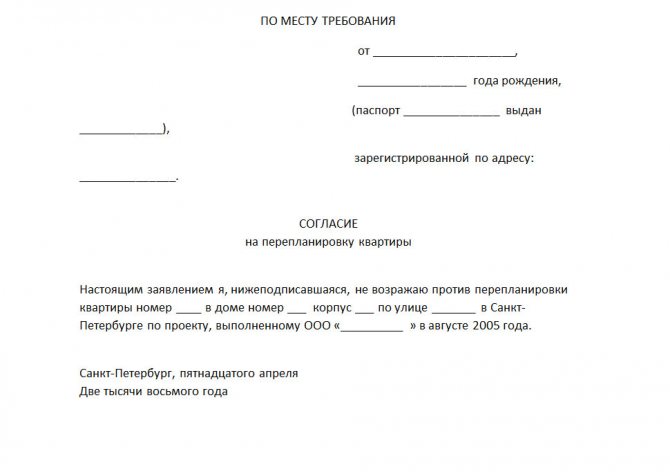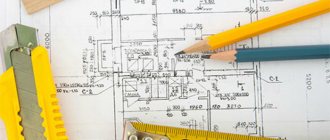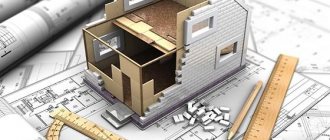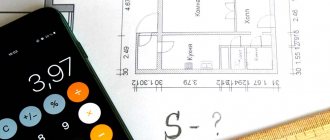Remodeling an apartment is a serious process that requires not only a responsible approach in terms of repairs, but also compliance with all legal regulations. Experts do not recommend rushing into this event. It is necessary to carefully weigh each action, especially regarding the demolition of walls and the combination of two rooms. You need to decide on the need for redevelopment and the possible consequences.
The main point when redeveloping an apartment is the compliance of all actions performed with the law. This allows you to avoid subsequent dismantling of the structure, and will also save your budget, eliminating additional expenses. The availability of design documentation for any change in the apartment regarding the dimensions of the room is not only necessary, but must be prepared by a specialized company that has SRO approval.
Dear readers! The article talks about typical ways to resolve legal issues, but each case is individual. If you want to find out how to solve your particular problem , contact a consultant:
8 (800) 700 95 53
APPLICATIONS AND CALLS ARE ACCEPTED 24/7 and 7 days a week.
It's fast and FREE !
It should be remembered that unauthorized redevelopment with subsequent approval does not always end successfully. Recently, the authorities have tightened measures on this type of activity, as well as being as strict as possible when accepting unauthorized conversion of an apartment.
The owner must be prepared to defend his rights in court, even if the initial examination does not reveal any violations. The very fact of making changes to the design of a residential premises does not comply with the legal norms of the Housing Code of the Russian Federation and safety regulations, therefore it is necessary to follow the established procedure for remodeling an apartment.
Sample application for redevelopment of residential premises:
General provisions
The concept of unauthorized planning is enshrined in the Housing Code. It means making changes to the layout of an apartment or other premises without obtaining the consent of authorized authorities. In addition, redevelopment that does not correspond to the project received in advance, if it was approved, will also be considered unauthorized.
Important! Redevelopment without prior permission is considered illegal, so a person may be forced to return the remodeled apartment to its original position. In addition, a fine of one to thirty thousand rubles will be imposed.
Redevelopment that has already been made can only be recognized as legal by judicial authorities. They have the right to allow the changes made to remain and give the go-ahead for official registration.
Legalization of unauthorized planning
Illegal changes made to an apartment are associated with many possible problems in the future. For example, it will definitely not be possible to sell it, because the actual layout will differ from that indicated in the BTI documents. The living conditions themselves may also worsen: humidity will rise, mold will appear due to dampness, ceilings and built partitions will begin to collapse.
It is important to know! There are two similar concepts: “redevelopment” and “re-equipment”. The first means, for example, moving walls or eliminating them, increasing the area of individual rooms or a kitchen. Re-equipment is necessary to work with communications: to install new pipes, move old ones or change them altogether. Both the first and second works require obtaining permission for them and further inclusion in the registration certificate of the apartment.
To legitimize the redevelopment already done in the apartment, you need to follow the algorithm below. It consists of several stages:
- Collection of necessary documents.
- Administration notification.
- Going to court.
- Notification of changes to the cadastral registration authority.
- Registration of changes in Rosreestr (not in all cases).
Next, we will consider each of the stages in more detail.
Collection of documents
Without preparing all the necessary documents, it will not be possible to legalize the redevelopment of the apartment. Package of papers that need to be collected:
- extract from the register of real estate;
- technical passport, in which case the home owner will have to order it from the BTI or through the MFC; it is not allowed to use the old version that is already available;
- a certificate from the SES stating that the apartment fully complies with established sanitary standards. To do this, you need to come there and write a corresponding application. In a few days, a registrar will come to the address you left to inspect the apartment. If everything is in order and the housing complies with current sanitary standards, the person will be given a written conclusion;
- apartment project. You won’t be able to do it yourself; the document must be ordered from a specialized company. However, you can simply make a sketch or drawing. To do this, a floor plan is taken as a basis, in which all changes made are marked in red ink.
When a person already has all the documents in his hands, he must notify the architecture department of the local administration about the complete redevelopment of the apartment. This must be done without delay.
Going to court
After going to the administration, the interested person (the owner) writes a statement of claim to the court in order to legalize the unauthorized redevelopment.
The application itself does not have any weight, therefore the following documents must be attached to it:
- An extract from the real estate register confirming ownership. Let us pay special attention to the fact that previously, instead of it, everyone had a Certificate of Registration in their hands in the form of a document on an official colored form. However, since mid-2016 it was canceled and stopped issuing. If for some reason the extract is missing, then you can attach the agreement on the basis of which the owner acquired ownership rights. We are talking about a written agreement of purchase and sale, exchange, rent, etc. A document on acceptance of inheritance is also suitable if the apartment was received by inheritance.
- Technical passport for the specified object.
- Conclusion of the sanitary-epidemiological service.
- A project created by a licensed design company.
After accepting the claim, the court sets a date for a hearing, during which the case is considered on its merits. However, in some cases a person may be denied legalization for redevelopment. Then the property owner will have to return everything to its original position, as well as pay a fine to the state budget.
Positive decision
If the judicial authority takes the side of the plaintiff and makes a decision in his favor, then the owner will have to, first of all, order a new registration certificate for the housing. This is done as follows:
- The owner applies to the BTI (or MFC), having previously paid the state fee, and provides a package of documents. You need to bring a civil passport and a document for residential premises (extract from the real estate register). Sometimes other certificates are required, which are better to check with the organization itself.
- Next, the BTI employee enters the necessary information into the application, accepts the documents provided and issues a call for a technician to record the current condition of the apartment after the redevelopment.
- Then the applicant is given a receipt indicating the approximate date of issue of the new registration certificate. This usually occurs 10 days after acceptance of the application for work.
- On the appointed date, the homeowner comes to the BTI and picks up the document. You must have your passport and receipt with you.
After receiving the registration certificate for the apartment, you need to make changes to the cadastral registration. To do this, the homeowner brings an application, a civil passport, a new registration certificate, a conclusion from the SES and a copy of the court decision to the Cadastral Chamber (or MFC). You will definitely need to pay a state fee; without it, the application will not be accepted for consideration. Next, a date is set on which an employee of the organization will visit the apartment, inspect it and note in the protocol all the changes that have occurred. After this is done, the cadastral registration authorities prepare a new cadastral passport: this is what is subsequently issued to the home owner.
In some cases, namely, if after redevelopment work the square footage of the residential premises has changed, the owner will have to contact the territorial office of Rosreestr to register everything properly. You must take with you an identification document and a new registration certificate.
Procedure for remodeling an apartment
Before starting renovation work, it is necessary to draw up a plan that includes a certain procedure for remodeling the apartment.
It is characterized by the consistency of the apartment owner, the collection of documents and their submission to the relevant authorities:
- It is necessary to decide on the location of the redevelopment and specific actions - it is recommended to consider several possible options that comply with existing standards and requirements. You need to choose the method that is simplest in execution, corresponding to lower costs and uncomplicated execution.
- Sketch a plan for the proposed redevelopment.
- Invite a design specialist and describe the necessary changes in as much detail as possible based on the sketches. A company employee will offer the best redevelopment option, after which the owner enters into an agreement for the production of design documentation.
Many owners prefer to carry out redevelopment after the measures have been taken, based on the existing project, although this is not entirely legal and can be regarded as an unauthorized change in the configuration of the apartment. The project must be agreed upon, after which the repairs can only begin.
Sample apartment redevelopment project:
Project approval
After the design documentation is ready, it must be agreed upon by the BTI, fire inspectorate and utility service.
The sequence of actions is as follows:
- submission to the BTI of the project and all documents relating to the apartment and the owner (passport of the owner of the premises, registration certificate for the apartment, project with a detailed description of future changes, consent of neighbors and residents if necessary);
- submitting the project to the fire inspectorate;
- coordination with public utilities - gas, water supply, electrical networks.
Controlling authorities check the project for compliance with the planned changes and make a positive decision if there is no danger to the owner, neighbors and the integrity of the apartment building.
Sample consent of neighbors for redevelopment
Submission of documents
The complete list of documents is as follows:
- application from the owner or authorized representative for redevelopment of the apartment;
- design documentation completed by a company with SRO approval;
- documentation for the apartment (ownership, registration certificate);
- written consent of other owners of the living space, if any;
- written consent of the residents of the house or neighbors if the redevelopment affects their interests.
Additional documents may be required depending on the type of redevelopment, methods of its implementation and the individual characteristics of the apartment.

Sample of filling out the consent of all family members for redevelopment
Contacting the inspectorate
Applying to the BTI requires the personal presence of the owner or his representative with a full package of documents. You should ask about the list in advance, since some certificates have a certain expiration date (no more than 10 days). Otherwise you will have to collect everything again.
BTI employees check the technical documentation of the project for compliance with all norms and requirements that are prescribed in the legislation on redevelopment. If there are no violations, the project is approved and repair work can begin.
It is recommended to entrust redevelopment actions to a specialized company that has a special permit to carry out work and approval from an SRO. This improves the quality and safety of events, reduces completion times and has a positive effect on subsequent approvals.
Cost of legalization
Remodeling an apartment is not done for free, as you will have to pay for some services. Among them may be:
- obtaining a new technical and cadastral passport for housing;
- creating a project;
- going to court (payment of state duty, other costs);
- intermediary services, if the redevelopment and its subsequent legalization are not carried out on their own.
Typically, an accurate cost calculation depends on the complexity of the redevelopment being carried out, as well as individual, individual factors.
Redevelopment requirements
Not all changes made to an apartment can be legalized by the court. Redevelopment must be carried out in strict accordance with the requirements of the law. First, let's look at what is strictly forbidden to do:
- Demolish supporting structures and floors. Therefore, before redevelopment, you need to either look at the structural plan of the entire apartment building (you can request it from the BTI), or measure the thickness of the walls.
- Move common house radiators or ventilation pipes.
- Move the bathroom to another room if your neighbors have a “dry” area underneath it.
- Install a radiator for heating on the balcony.
- Significantly (by more than a quarter) enlarge the kitchen or toilet with bathroom at the expense of the living room. Because then the so-called “wet” zone will be above the “dry” zone of its neighbors below. If you want to expand or lengthen the kitchen space, you can use part of the corridor.
- Install an arched ceiling between the room and the kitchen, if the latter has a gas stove. The ban does not apply if there is an electric one.
- Extend the balcony to the living room itself. However, placing an arch between them is allowed.
- Place an additional bathroom in the room.
- The kitchen should have natural light coming from the street through a window or through installed glass partitions.
At the same time, redevelopment cannot worsen the current living conditions of neighbors. This sometimes happens if, for example, you place a bathroom on the second floor where the owners of the premises have a bedroom on the first floor. There is a high probability of a leak occurring.
We will also tell you what can be done during the redevelopment of the apartment:
- Creating an arch or sliding doors between the kitchen with a gas stove and the room. Only this option allows you to realize the kitchen-living room project.
- The bathroom can be expanded through the corridor. However, it must be taken into account that the floor of the toilet or bath should be located 3-5 centimeters lower than the adjacent room.
- Water equipment may be moved to other locations. For this purpose, new pipes are laid. You only have to save the drainage angle to avoid poor flow and drainage of water.
Oksana Ivanova, head of the city real estate department at NDV, answers:
All notes on the conversion of residential premises in apartment buildings must be reflected in the technical passport of the BTI. Namely, on the pages with the floor plan and explication. The seller of the apartment, as a rule, already has these documents on hand. If on the page with the floor plan there is a stamp “Permission for the re-equipment was not presented to the BTI”, it means that the re-development was carried out without permission, and the question of its legalization remains open. On the page with the explanation there should be a note with the number of the Housing Inspection act on the reconstruction of premises and the date of its issue. This suggests that the apartment was remodeled legally, but it is not indicated what kind of redevelopment. To find out exactly what permits were issued and for what, you need to request the specified act from the Housing Inspectorate.
How should a buyer check a secondary apartment?
Do small redevelopments need to be legalized?








